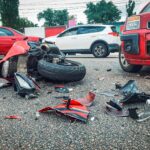[column parallax_bg=”disabled” parallax_bg_inertia=”-0.2″ extended=”false” extended_padding=”true” background_color=”” background_image=”” background_repeat=”” background_position=”” background_size=”auto” background_attachment=”” hide_bg_lowres=”false” background_video=”” vertical_padding_top=”0″ vertical_padding_bottom=”50″ more_link=”” more_text=”” left_border=”transparent” class=”” id=”” title=”” title_type=”single” animation=”none” width=”1/1″ last=”true”]
[column_1 width=”1/1″ last=”true” title=”” title_type=”single” animation=”none” implicit=”true”]
Riding The Hog
by Edward Knox
I grew up on a farm. One of the highlights of being a young farm boy was the opportunity to help break a young colt of adjoining farmers. There was something thrilling about seeing if you could conquer a young horse.
In our lives, all of us seek to experience some type of thrill; an opportunity to explore the unknown. It might be racing, bungee jumping or parachuting. Many people feel that riding a motorcycle is a thrill. Some ride to save gas because it is more economical. Others like driving down the road with the wind in their hair, with little protection from other vehicles and no protection from the weather elements.
It is a known fact that motorcycles are part of our transportation. Unfortunately, motorcycles are not seen by other drivers. Section 20-129(c) of the North Carolina General Statutes, states that “every motorcycle shall be equipped with at least one but not more than two headlamps,” and that “the headlamps on a motorcycle shall be lighted at all times while the motorcycle is in operation on highways or public vehicular areas.” Even so, it is a clear fact that motorcycle riders are vulnerable while on the roadway. In my practice, at one time, I had four motorcycle deaths and two serious injuries, all pending. One of my clients, a passenger on a motorcycle, lost her life when the driver of the motorcycle lost control on his driveway.
North Carolina now requires that every operator of a motorcycle have an endorsement on his or her driver’s license and there is also a requirement that each person must take and pass a knowledge test and an on-cycle skills test. The on-cycle skills test requires that the operator be knowledgeable about his or her riding limits, braking, adjusting speed, swerving quickly and making critical decisions.
North Carolina also requires that motorcycle operators wear helmets. South Carolina does not. It is atypical of South Carolina to be different in the areas of safety, and where I have had cases with motorcycle accidents without helmets or pads, the injuries are more severe and oftentimes deadly. Motorcycles now comprise 2 percent of all registered vehicles, and in 2003, it was estimated that motorcyclists were 32 times more likely than passengers in a car to die in a motor vehicle crash and 6 times more likely to be injured.
In 2004, statistics show that 4,008 motorcyclists were killed and an additional 76,000 motorcyclists were injured in traffic crashes in the United States, or 8 percent more than the motorcycle fatalities and 14 percent more than the motorcycle injuries reported in 2003. It is estimated that helmets saved 1,316 motorcyclists lives in 2004 and that 671 more lives could have been saved if they had been wearing helmets.
One of the sad commentaries about motorcycle injuries or deaths is that jurors do not have much sympathy for motorcycle operators. They see the risk taken by the motorcycle rider as being one that is inherent, and if a person is injured then the value of his or her life or injuries is diminished by the fact that he or she took the risk of riding a nontraditional mode of transportation. It is true even if the motorcyclist is free from fault, and if nothing else, the jury may mitigate the damages.
Motorcycles are here to stay, so if you ride one, be cautious and drive defensively. Likewise, other vehicle operators must realize that motorcyclists have the same rights on the road and that they must also keep a careful look out.
H. Edward Knox is the managing partner with Knox, Brotherton, Knox & Godfrey located at 817 E. Trade St., Charlotte, NC 28202 and can be reached at 704-315-2363 or 866-704-9059 (Toll free). Eddie is a Nationally Board Certified Civil Trial Specialist and has over forty (40) years of civil trial experience. The firm’s website is www.knoxlawcenter. Three of the firm’s attorneys live in Lincoln County.
[/column_1]
[/column]
[column parallax_bg=”fixed” parallax_bg_inertia=”-0.2″ extended=”true” extended_padding=”true” background_color=”” background_image=”http://knoxlawcenter.com/wp-content/uploads/scales-of-justice-extra-white.jpg” background_repeat=”” background_position=”” background_size=”auto” background_attachment=”” hide_bg_lowres=”false” background_video=”” vertical_padding_top=”30″ vertical_padding_bottom=”70″ more_link=”” more_text=”” left_border=”transparent” class=”” id=”REQUEST-CONSULTATION” title=”” title_type=”single” animation=”none” width=”1/1″ last=”true”]
[text_divider type=”single”]
How Can We Serve You?
[/text_divider]
[column_1 width=”1/1″ last=”true” title=”” title_type=”single” animation=”none” implicit=”true”]
[push h=”-20″]
Fields with * are required.
[push h=”20″]
[/column_1]
[column_1 width=”1/1″ last=”true” title=”” title_type=”single” animation=”none” implicit=”true”]
[/column_1]
[/column]






